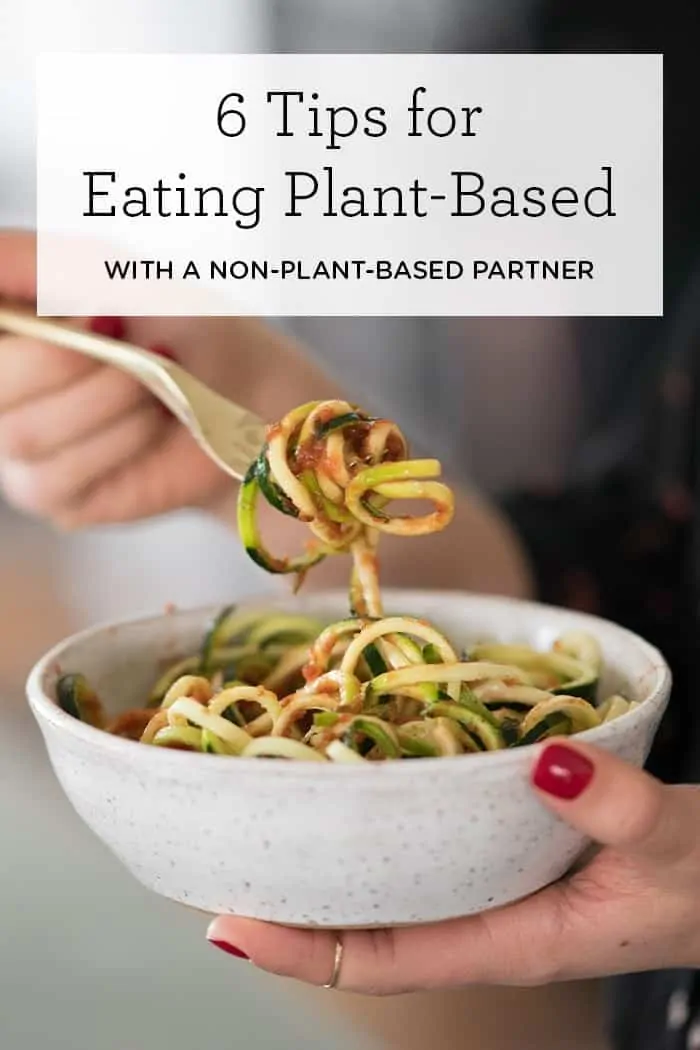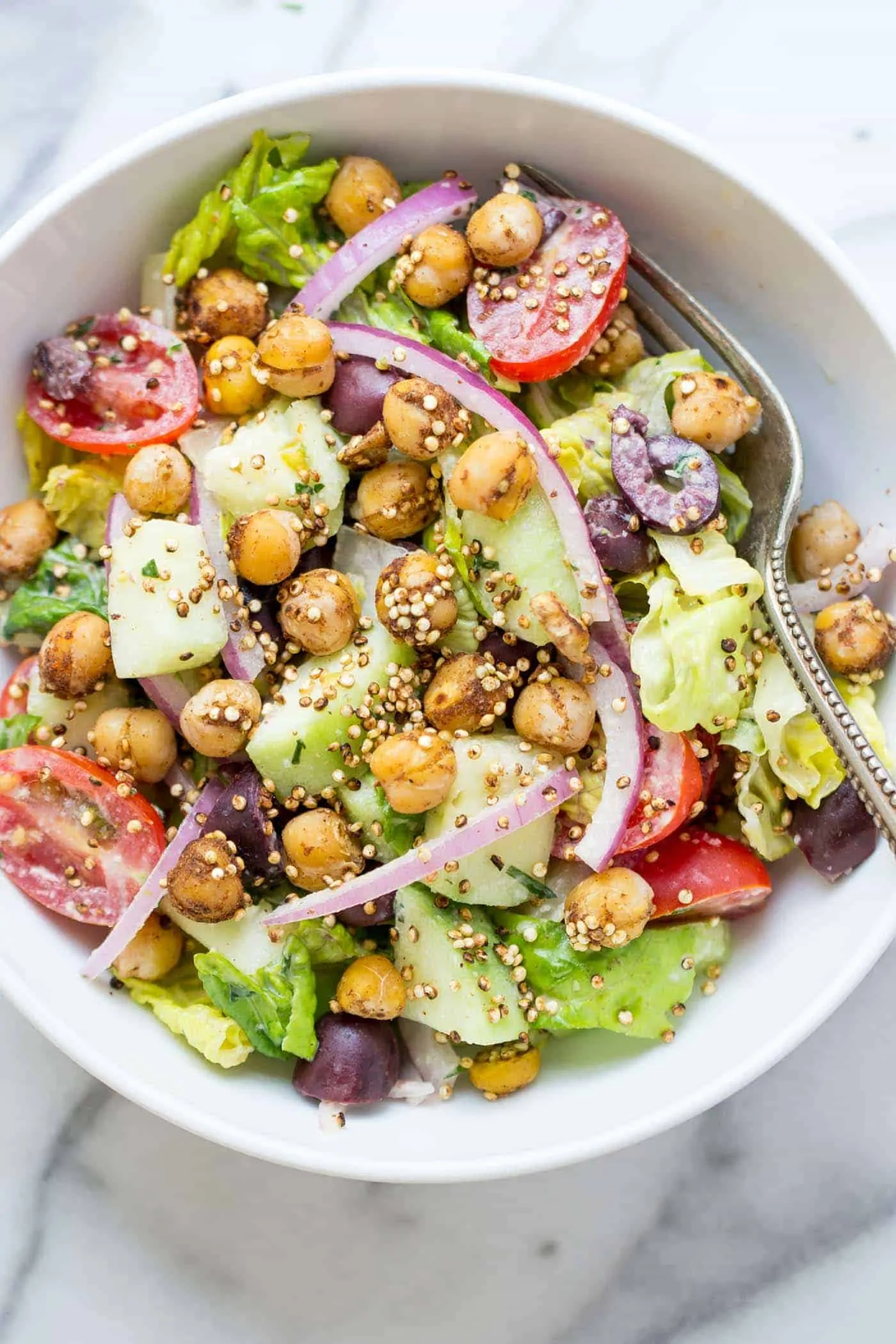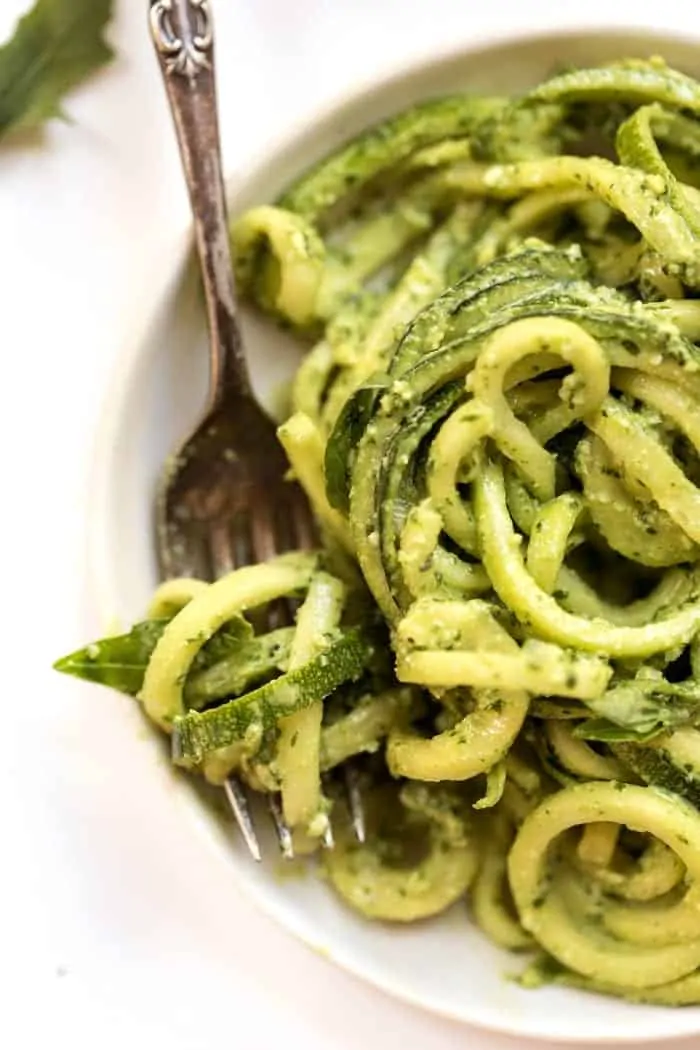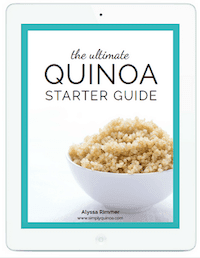If your partner doesn't eat the same way you do, listen up! Here are 6 tips for eating plant-based with your non-plant-based partner that are super helpful!

One of the biggest questions I get from our YouTube community is how I handle eating a plant-based diet with a non-plant-based partner. And I totally get it! When I'm dating and living with someone who isn't eating the same diet you are, it can be really challenging.
As you probably know, Matt and I have been together for over 8 years, so he's seen me through a lot of diet changes. When we first started dating in college, I ate whatever I wanted. Then I went gluten-free and dairy-free, then I added dairy back into my diet, then I removed it again, then I stopped eating red meat, then poultry, and finally got to where I am now: eating a mostly plant-based diet with the occasional fish and eggs.
So I'll start by saying this transition has been a slow one and he's had time to adjust over time which I think has made it easier.
But not everyone is in this same position. Maybe you've signed up for one of my plant-powered programs, like our 21-day reset or Powered by Plants, and you're ready to make the change overnight. Or maybe you're already plant-based and just started dating someone who isn't.
Regardless of where you are, I wanted to share some tips that I've learned along the way that I think will help you navigate this in your own life!
Tips for Eating Plant-Based with a Non-Plant-Based Partner
I want to preface by saying that my goal with Matt and my journey wasn't ever to make him be plant-based. It's more how we have navigated as a couple, how I've figured out how to save more time in the kitchen, and ultimately inspire him to eat healthier and add more plant-based foods to his diet.
1. Make The Same Base Meal
One of the most challenging things with having multiple diets in the house are the meals and adding more cooking to your plate. The thing I have found to be the MOST helpful is to cook the same base meal for both of us, then we can each add whichever protein we want.
This usually looks like a blend of vegetables and grains, then I add some beans and he adds chicken (or fish). Sometimes it's salad, sometimes it's quinoa bowls, other times it's a stir-fry. Essentially, I'm just cooking the base of the meal!
This method has allowed me to save time in the kitchen because I'm not creating two separate meals and as time has gone on, he has become more and more open to trying new things.
Need some inspiration? Here are some recipes to try:
- Cozy Quinoa Buddha Bowls
- Roasted Veggie Quinoa Bowls
- Taco Mason Jar Salads
- Curry Roasted Veggie Bowls
2. Do The Grocery Shopping Together
Next is to get your partner involved in the shopping! This is definitely the biggest struggle we have – I love grocery shopping, he hates it – but the times we do go together, I notice that he's so much more excited about our meal plan for the week and more invested in what we're buying.
Another benefit is that your partner will see what ingredients you're picking up. And it's an opportunity for you to share why you are choosing to eat certain things, mention the nutritional benefits and get them even more interested. I've seen that when we do shop together, he ends up being more open to trying what I'm eating (rather than me just putting a plate in front of him).
3. Don't Force Your Diet On Them
Above all else, you can't force your diet on them. It's important to remember that you are each coming at this from different backgrounds, different upbringings, and potentially even different cultures.
If you want your partner to embrace your plant-based lifestyle, share why YOU have chosen to eat this way. Why is it important to you? Why do you love it? How has it made you feel?
Think about educating your partner in a kind and loving way. And put yourself in their shoes. If you were being constantly berated and nagged about how you were eating, would you be open to making changes? Probably not!
4. Be Patient
As with anything new, it takes time to build new habits so be patient. Most people aren't going to be up for changing overnight.
Realize this change might be a very slow one (we're going on 8 years!), but over time it will get easier. The biggest thing you can continue to do is be helpful, understanding and give them new ideas.
That's one of the things that has really helped in my relationship – I try to accommodate us both as best I can and don't get mad at him when he doesn't want to eat my tofu or chickpeas. Using this strategy, it will shock you to see how far he has come. He's now so much more open to new foods and it's getting easier and easier for us.
5. Encourage Them to Try New Foods
This tip is particularly meant for those of you who have a very “meat and potatoes” partner. Someone who insists on having meat at every meal and isn't open to anything new.
I totally get how challenging that can be! Granted, Matt wasn't quite as close-minded as some, but there were definitely times I wanted to throw up my hands and just say, “won't you at least try it!?” I'm sure many of you have been there too.
So my strategy here is to encourage them to try new foods. Start with the basics – things they already like – and then work your way up to “weirder” foods. Try swapping out pasta for a bean-based pasta, try my 5-ingredient Quinoa Pizza Crust, stir some quinoa into their chili, etc. The more they try, the more open their mind becomes!
6. Be Flexible
Last, but certainly not least, be flexible!
This can be very challenging when you're dating someone (or married to someone) who is very inflexible in their beliefs, but try your best because it will make a big difference.
Now I'm not saying be flexible with what you eat – I think you deserve to eat what you want and should eat what you want – but be flexible and accommodating with the way their eating. Be flexible with the meals you make and be flexible when you eat out. Don't always force them to go to vegan-only restaurants; try to find some common ground.
This will make the transition a heck of a lot easier because they don't feel like the change is happening TO them, but actually FOR them, and they're a part of that change. They'll be much more open to change when you can be a bit flexible during their change and really understand where they're coming from.
What about you?
Have you found yourself in this same situation? If so, we'd love to hear what has worked (and maybe what hasn't)! Please share your best tips for eating plant-based with a non-plant-based partner down in the comments below!
New to cooking quinoa? Grab your FREE Quinoa Starter Guide!
Become part of the Simply Quinoa community and receive weekly emails with exclusive content that I only share in email, as well as my in-depth guide to starting your quinoa journey.


